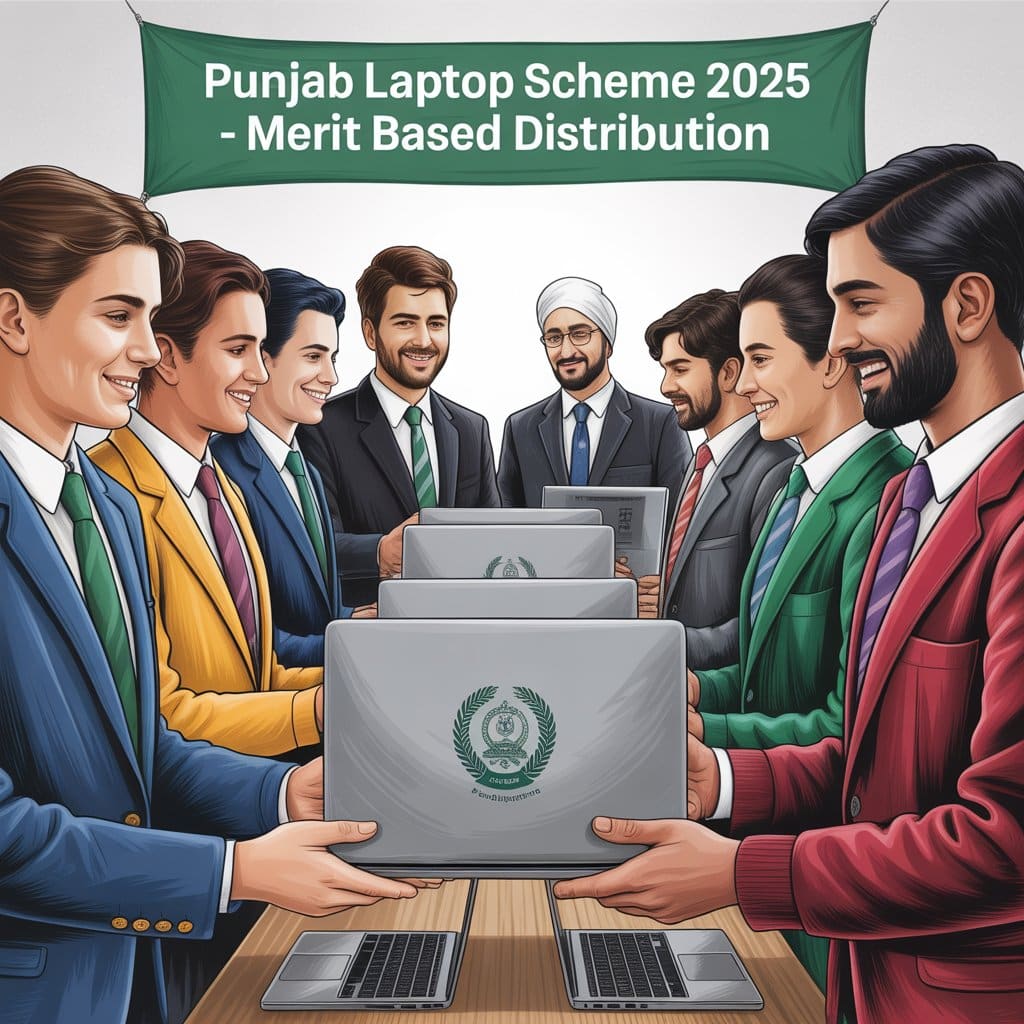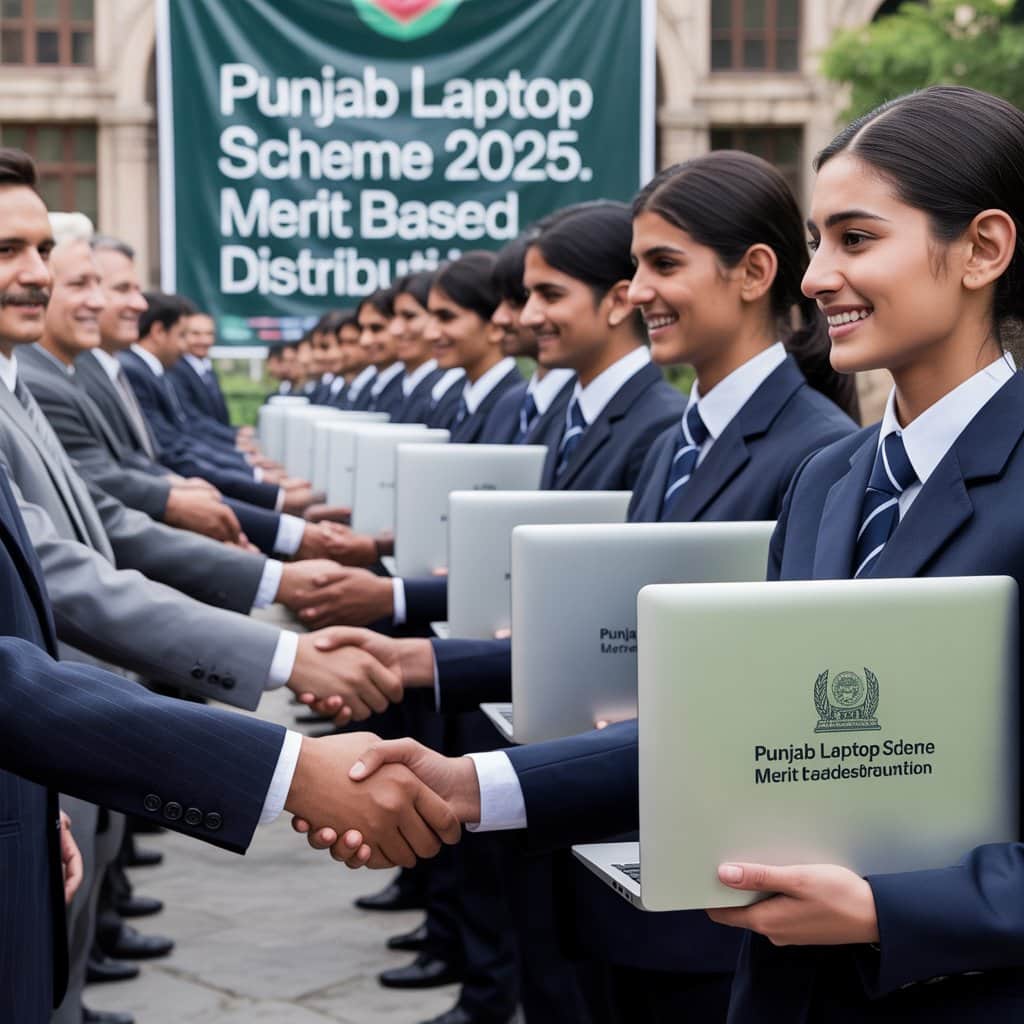Starting Next Month Laptops will be distributed to students on merit under Punjab Laptop Scheme 2025 to boost digital education and online learning.
Starting next month, laptops will be distributed to students based on merit under the Punjab Government’s Laptop Scheme 2025. Chief Minister Punjab, Maryam Nawaz, officially confirmed that the program will begin in September 2025, with transparent, merit-based distribution. According to government announcements, this initiative is part of Punjab’s wider efforts to promote digital education, support freelancing, and empower youth through technology.
The main keyword, Starting Next Month Laptops Will be Distributed to Students Based on Merit, is central to this policy, as the government emphasizes fairness, accountability, and transparency. Unlike earlier schemes, this program has been designed with stricter eligibility criteria and digital verification systems to ensure laptops go only to the most deserving candidates.Starting Next Month Laptops.
Official website : cmlaptophed.punjab.gov.pk
CM Punjab’s Announcement
In a recent address, Starting Next Month Laptops Chief Minister Maryam Nawaz reaffirmed her administration’s priority to equip students with tools for modern education. She stated that Starting Next Month Laptops Will be Distributed to Students Based on Merit, marking September 2025 as the launch date.Starting Next Month Laptops.
Maryam Nawaz Starting Next Month Laptops highlighted that laptops are no longer luxury items but essential tools for education, research, and employment. She noted that the scheme is designed to address the digital needs of university and college students, ensuring they can participate in e-learning, access research papers, and compete in global academic environments.Starting Next Month Laptops.
According to official updates, the Punjab Government has allocated significant funding for this scheme to guarantee widespread implementation while maintaining strict merit criteria.Starting Next Month Laptops.
Merit-Based Laptop Distribution
The Laptop Scheme 2025 emphasizes a merit-based framework. The process will be managed by universities and colleges, which will submit verified academic records to the government.
Key points of the distribution include:

- Eligibility – Only high-performing students with strong academic results will qualify.
- Transparency – Universities will prepare official lists, verified at multiple levels.
- Exclusion – Students who previously received laptops in older schemes will not be eligible again.
- Fairness – Distribution will prioritize students regardless of background, ensuring rural and urban candidates are equally considered.
The government has stressed that the distribution process will follow digital verification systems to eliminate duplication or misuse.
Why Merit-Based Distribution Matters
The Punjab Government has clarified why Starting Next Month Laptops Will be Distributed to Students Based on Merit instead of general distribution. The main reasons include:
- Academic Excellence – Students who consistently perform well should be rewarded and supported.
- Equal Opportunities – Rural and urban students will have equal access.Starting Next Month Laptops.
- Transparency – By focusing on verified academic lists, the process reduces corruption risks.
- Competitiveness – Ensures Pakistan’s youth can compete in international digital markets.
This policy builds credibility and strengthens public trust in government initiatives by preventing misuse and duplication.
Expected Benefits of the Scheme
The Laptop Scheme 2025 is expected to deliver wide-ranging benefits:
| Benefit | Details |
|---|---|
| Digital Learning | Students will access online lectures, e-libraries, and research papers. |
| Freelancing Opportunities | Laptops open doors to freelancing platforms, creating income sources. |
| Skill Development | Students can learn coding, programming, digital design, and IT. |
| Reduced Digital Divide | Rural students will have better opportunities to compete with urban peers. |
| Educational Innovation | Universities will integrate laptops into labs, lectures, and assignments. |
| Research Advancement | Access to digital libraries will improve higher education outcomes. |
| Global Competitiveness | Pakistan’s youth will be able to compete in global academic and professional markets. |
Application Process
Though the official portal is not yet open, the government has outlined the expected process:
- Online Registration – Students will apply through the Punjab Government portal.
- Submission of Academic Details – Including CNIC, roll number, and institution data.
- Verification by Universities – Colleges will cross-check academic records.
- Merit List Publication – Verified lists will be uploaded on the official website.
- Distribution Ceremonies – Laptops will be distributed across Punjab’s institutions.
This clear, step-by-step framework ensures fairness and accessibility for all applicants.

Previous Laptop Schemes in Punjab
Punjab has implemented laptop distribution schemes in the past. Earlier programs reached thousands of students but faced concerns about transparency. Some reports indicated that non-merit students also benefited, leading to criticism.
The Laptop Scheme 2025 introduces improvements:
- Centralized online applications.
- Digital verification of records.
- Restricting laptops to new beneficiaries only.
This addresses earlier shortcomings and strengthens the scheme’s credibility.
Digital Transformation in Education
The statement that Starting Next Month Laptops Will be Distributed to Students Based on Merit reflects a larger shift in education. Globally, countries are investing in digital classrooms, e-libraries, and online courses.Starting Next Month Laptops.
For Pakistan:
- Blended Learning – Laptops enable a mix of classroom and online education.
- Global Platforms – Students gain access to Coursera, Udemy, and EdX.
- Research Access – Digital libraries provide international knowledge resources.
- Exam Preparation – Helps in preparation for CSS, PMS, and other competitive exams.
This aligns with global trends in education modernization.
Economic and Employment Impact
The Laptop Scheme 2025 will also impact Pakistan’s economy, especially in the IT and freelancing sectors.
- Pakistan is among the top 5 countries in freelancing growth, according to international rankings.
- In FY 2024, Pakistan’s IT exports reached $3.2 billion (PSEB data).
- Equipping more students with laptops can further boost IT exports by expanding the freelance workforce.
Students with laptops will be able to join platforms like Fiverr, Upwork, and Freelancer, increasing both personal income and national foreign exchange earnings.
Challenges and Implementation Concerns
While the scheme is promising, experts highlight challenges:
- Logistics – Distributing laptops across Punjab’s districts requires efficient coordination.
- Verification – Ensuring authenticity of academic records is critical.
- Technical Support – Students may need training and after-sale services.
- Rural Access – Internet connectivity in rural areas remains a barrier.
Addressing these issues will ensure the long-term success of the program.
Role of Technology in Bridging the Digital Divide
The Punjab Government recognizes that laptops can bridge educational and economic gaps. Rural areas, often left behind in digital adoption, will benefit significantly.
- Urban-Rural Equality – Ensures rural students get equal opportunities.
- Gender Inclusion – More female students can access technology for education.
- Educational Access – Reduces reliance on physical libraries and resources.
By reducing the digital divide, Punjab can move closer to achieving inclusive education goals.
Digital Pakistan Vision
The Laptop Scheme 2025 is aligned with Pakistan’s Digital Pakistan Vision, which focuses on:
- Expanding digital literacy.
- Promoting e-governance.
- Boosting IT exports.
- Building a knowledge economy.
Distributing laptops on merit strengthens this policy by creating a digitally empowered student base.

International Comparisons of Laptop Schemes
Globally, similar programs have been implemented:
- India – Tamil Nadu and Uttar Pradesh introduced free laptop schemes.
- Malaysia – The 1Malaysia Laptop Project supported low-income students.
- Bangladesh – Distributed laptops to promote e-learning in rural areas.
Punjab’s merit-based model offers lessons in accountability that other countries can adapt.
Laptop Scheme 2025? Students with strong academic records verified by universities.
When will distribution start?
Starting next month, laptops will be distributed to students based on merit, beginning September 2025.
Can rural students apply?
Yes. Starting Next Month Laptops The government has emphasized equal access for rural and urban areas.
Will previous beneficiaries qualify?
No. Students who received laptops in past schemes will not be eligible.
How to apply?
Through the Punjab Government’s online registration portal (to be announced).
Economic and Employment Impact of the Laptop Scheme 2025
One of the strongest arguments in favor of the Punjab Laptop Scheme 2025 is its potential to create direct and indirect economic opportunities. By providing laptops to students, the government is not only investing in education but also contributing to Pakistan’s digital economy.
Growth of Freelancing in Pakistan
According to data from the Pakistan Software Export Board (PSEB) and the Ministry of IT and Telecommunication, Pakistan is among the top five countries globally in terms of freelancing workforce. Reports indicate that over 1.5 million Pakistanis are actively engaged in freelancing, contributing hundreds of millions of dollars annually in foreign exchange earnings.Starting Next Month Laptops.
Equipping students with laptops allows them to join global freelancing platforms such as Upwork, Fiverr, and Freelancer. Many Pakistani students already earn income by providing services like graphic design, digital marketing, programming, and content writing. The provision of laptops through this scheme will significantly expand the talent pool and support Pakistan’s positioning as a hub for IT outsourcing.Starting Next Month Laptops.
Contribution to IT Exports
Pakistan’s IT exports have grown steadily in recent years, crossing the USD 3 billion mark in 2024. Analysts believe that greater digital access will accelerate this trend. When university students have access to reliable laptops, they can contribute to software development, mobile applications, and other digital services that are in high demand worldwide.
The Punjab Government has highlighted that the laptop scheme is not just an educational project but also a step toward increasing IT export revenues by preparing a larger, digitally skilled workforce.
Youth Employment Opportunities
Unemployment among educated youth remains a challenge in Pakistan. The Higher Education Commission (HEC) reports that thousands of graduates each year struggle to find traditional employment opportunities. Digital platforms, however, offer new pathways to earning and skill development.Starting Next Month Laptops.
With access to laptops, students can explore remote work, internships, and online collaboration opportunities. This is especially relevant in a post-pandemic world where remote employment has become a global norm.
Challenges and Implementation Concerns
While the Punjab Laptop Scheme 2025 has clear benefits, the government will need to address practical challenges during implementation. Ensuring fair distribution and maintaining transparency are top priorities.
Academic verification will require strong coordination between universities and the Higher Education Department. With thousands of applicants across Punjab, even minor errors in merit list preparation could lead to disputes. The government has indicated that it will establish digital monitoring systems to minimize errors and ensure accurate record-keeping.Starting Next Month Laptops.
Distribution in rural areas is another challenge. Students in far-flung districts may face difficulties in traveling to collection centers. To resolve this, the government is considering local distribution points through district-level institutions.Starting Next Month Laptops.
Maintenance and technical support also require planning. Laptops are long-term investments, and without repair facilities, students may face difficulties in keeping them functional. Partnerships with IT vendors and service providers are expected to be a part of the program to ensure after-sales support.

Role of Technology in Bridging the Digital Divide
The Punjab Laptop Scheme 2025 plays a vital role in bridging the digital divide between urban and rural students. Access to personal laptops can transform how students learn, communicate, and explore knowledge.
Rural students often face greater challenges due to limited infrastructure, fewer educational resources, and lack of personal digital devices. By awarding laptops on merit, the government ensures that high-performing students from these areas gain equal access to technology.
The scheme also supports gender inclusion. Female students, particularly in rural and semi-urban regions, face higher barriers in accessing technology. Through transparent and merit-based distribution, the program ensures that deserving female students are equally empowered.
Digital Pakistan Vision and the Laptop Scheme
The Laptop Scheme 2025 is closely linked with Pakistan’s broader “Digital Pakistan” vision, which aims to expand connectivity, e-governance, and IT-enabled services across the country.
According to government reports, Pakistan’s digital economy is a rapidly growing sector, with IT exports and digital services contributing significantly to GDP. By providing laptops, the Punjab Government is directly enabling students to become part of this transformation Starting Next Month Laptops.
The scheme supports other national initiatives such as online learning platforms, digital skills training, and youth entrepreneurship programs. Together, these initiatives create an ecosystem where young people can use technology not only for education but also for innovation and economic development.
nternational Comparisons of Laptop Schemes
Governments worldwide have introduced technology-based programs to bridge the digital gap in education. Comparing Punjab’s initiative with international laptop distribution schemes provides valuable context.
India’s Free Laptop Programs
In India, several state governments have run laptop distribution schemes for students completing higher secondary or undergraduate educationStarting Next Month Laptops. For example, Tamil Nadu’s Free Laptop Scheme has distributed millions of devices to eligible students over the past decade. The aim has been to encourage digital literacy, support online learning, and ensure access to government e-services. Punjab’s 2025 program is similar in spirit but distinct because it emphasizes academic merit as the primary criterion.
Malaysia’s 1Malaysia Laptop Program
Malaysia launched the 1Malaysia initiative to distribute laptops to students from low-income households. The program was part of the broader digital inclusion strategy to ensure that all citizens, particularly the younger generation, could benefit from internet access and e-learning. Independent evaluations of the program showed improvements in digital participation, although challenges in maintenance and long-term use were also noted.
Bangladesh’s Digital Bangladesh Vision
Bangladesh has taken multiple steps under its “Digital Bangladesh Vision 2021” program, including distribution of computers and tablets to students and teachers. The emphasis has been on integrating digital devices into schools and higher education institutions. Punjab’s scheme aligns with this model by focusing on equipping students for modern learning environments.
Lessons for Punjab
From international experiences, three key lessons emerge:
- Maintenance Facilities: Long-term use of laptops requires accessible repair and support networks.
- Digital Literacy: Device distribution must be accompanied by training to maximize benefits.
- Equity and Access: Ensuring inclusion of female students and those in rural areas is crucial for success.
Punjab’s 2025 scheme incorporates some of these lessons by prioritizing transparency, academic merit, and integration with broader digital education goals.
Future Prospects of the Punjab Laptop Scheme 2025
While the current phase focuses on higher education students, policymakers have signaled that the program could expand further if successful. Potential future directions include:
- Integration with E-Learning Portals: Connecting distributed laptops with official portals where students can access lectures, research papers, and government-approved online courses.
- Tablets for Secondary Schools: Extending device distribution to secondary and higher secondary school students through cost-effective tabletsStarting Next Month Laptops
- Public-Private Partnerships: Collaborating with multinational technology companies to provide discounted software, cybersecurity tools, and cloud services.
- Skill Development Add-Ons: Linking laptop distribution with IT training programs in artificial intelligence, data science, and digital marketing.Starting Next Month Laptops
Such expansions would not only strengthen digital education but also prepare Pakistan’s youth for the global knowledge economy.
Frequently Asked Questions (FAQs)
Who is eligible for the Punjab Laptop Scheme 2025?
Students enrolled in public universities and colleges in Punjab with strong academic records are eligible. Specific merit criteria will be published by the Higher Education Department.
Can students who previously received laptops apply again?
No. According to official announcements, students who already benefited from earlier laptop distribution schemes will not be eligible this time.
How will students apply?
Applications are expected to be submitted through an official government portal. Applicants will provide CNIC, enrollment numbers, and academic details. Universities will then verify the information before merit lists are finalized.
Will rural students have equal access?
Yes. The government has emphasized equal opportunity for both urban and rural students. Laptops will be distributed on merit, regardless of location.
When does distribution begin?
According to Chief Minister Maryam Nawaz, distribution will begin in September 2025 following completion of registration and verification.

Conclusion: Starting Next Month Laptops
The Starting Next Month Laptops5, set to begin next month, represents a major step toward expanding digital access in higher education. By distributing laptops strictly on merit, the government aims to empower hardworking students, reduce the digital divide, and support Pakistan’s participation in the global digital economy.Drawing lessons from international models, the program emphasizes fairness, accountability, and long-term impact.Starting Next Month Laptops With its alignment to the Digital Pakistan Vision, the scheme is positioned not just as an educational initiative but as a foundation for broader economic growth through freelancing, IT exports Starting Next Month Laptops, and innovation.If implemented effectively, the Punjab Laptop Scheme 2025 will serve as a landmark project in bridging educational inequality, enhancing skill development, and preparing Pakistan’s youth for the challenges and opportunities of a digital future.

